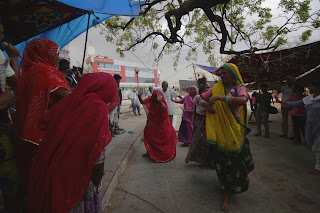A month long journey which bent, changed and destroyed many of my perspectives towards social justice, inequality and life. I was on a scholarship by Spic Macay. It was one of the toughest journeys I have been on, so far, both from outside and the inside. Sleeping in the park, bathing on footpath and drinking tanker water taught me the value of small luxuries of life, and I was not alone, there were 200 more people. It gave me strength. Little luxuries of life which we generally ignore like a toilet. It was also a time when I made precious personal relationships with people so devoted to a change like Aruna Roy, Nikhil dey, Shankar singh, Naurti Bai, Kavita Shrivastava and Gurpreet ji. Meanwhile Shankar Singh became Sankar mama and Aruna Roy became Aruna Nani and Kishan Singh became Kisan Kaka.
I met different brilliant people from all walks of life working towards a strong collective cause, most of them were the people who left high paying high power jobs and devoted their life for the masses who needed help. Ironically, what I learnt was not to leave my profession and settle in a village, but to work hard, be honest and help with my capacity to whichever profession I want to pursue. More than anyone else I learnt humility from the people at the grassroots. “When you don’t have anything, don’t go to a rich man’s house, he will shoo you away. Go to a poor man’s hut and he will give you food”. Meeting people who left their families, their fields and friends behind for a collective cause induced a passion like never before. I Learnt how important our constitution is and what immense powers it gives us. Just being aware of our rights gives us so much confidence. I learnt that in order to bring a change we have to question. There is no power which can stop us from questioning. It is our constitutional right. I understood the power of being a collective and how it has the strength to bend and destroy extreme establishments. “chetto, ekko, Khadko” Think. Collect. Act. This is what Aruna nani taught us every day. This is what made a small mud hut in a small village of Devdungri in Rajasthan to become the mother of the revolutions like the Right to Information, Right to food security and NREGA.









Comments